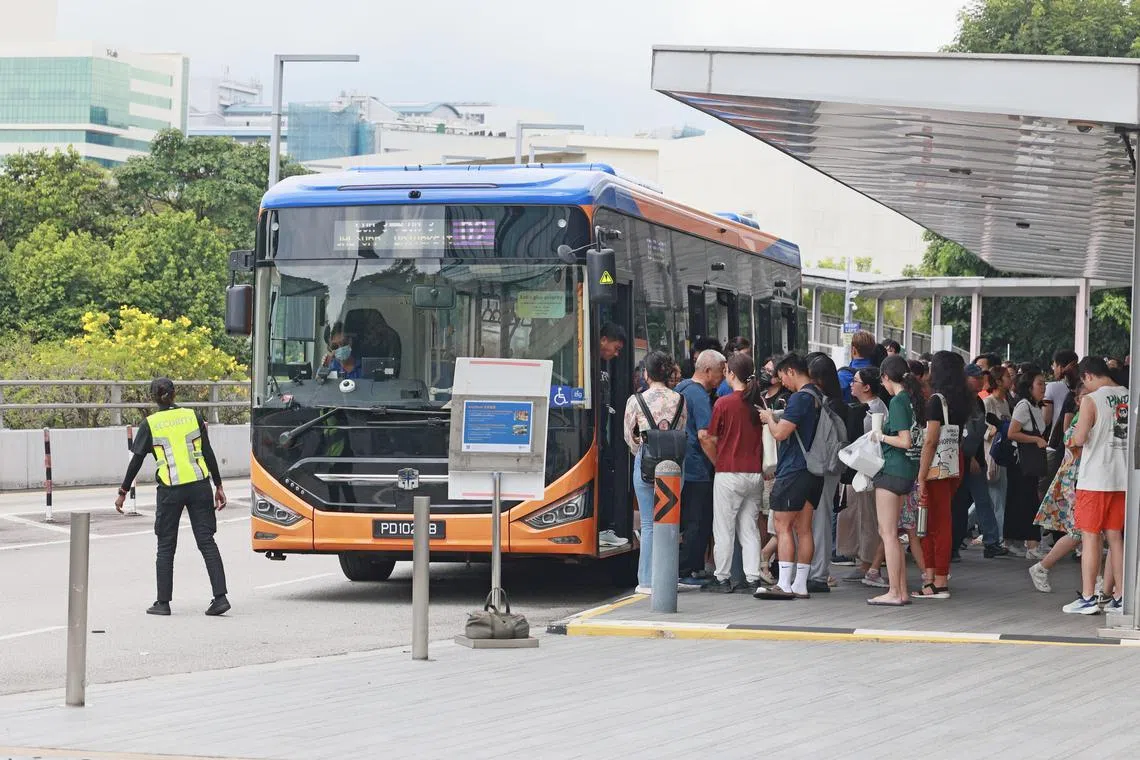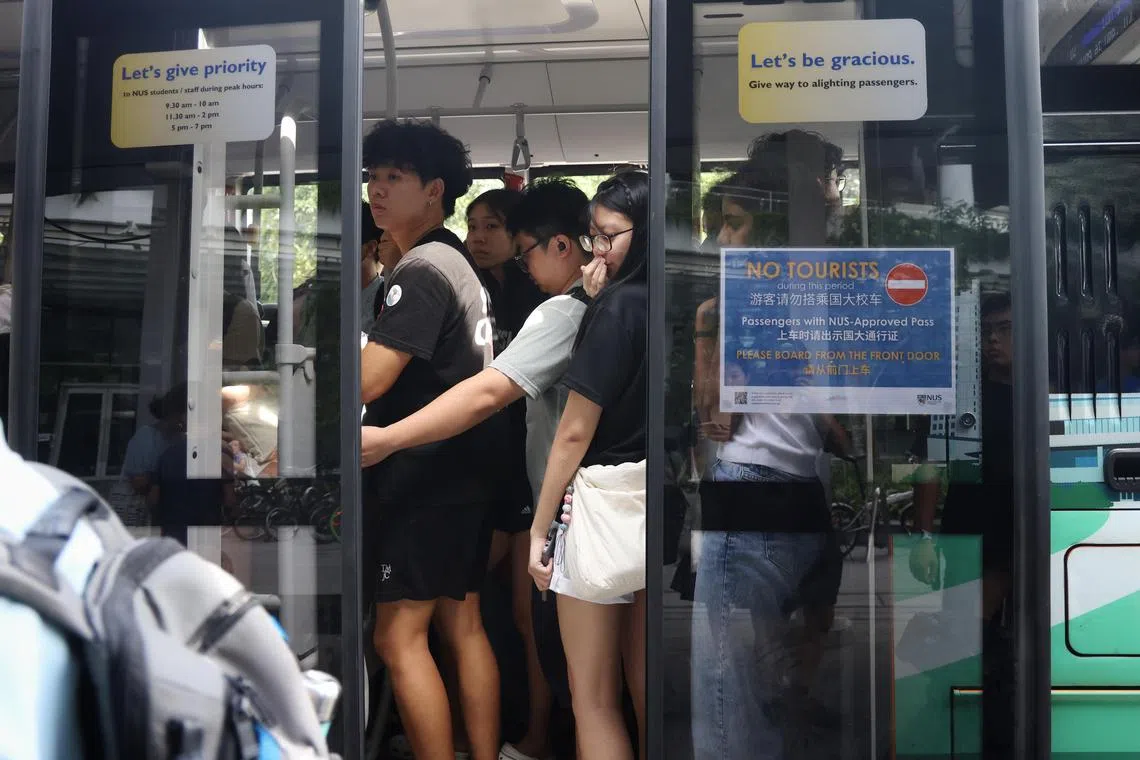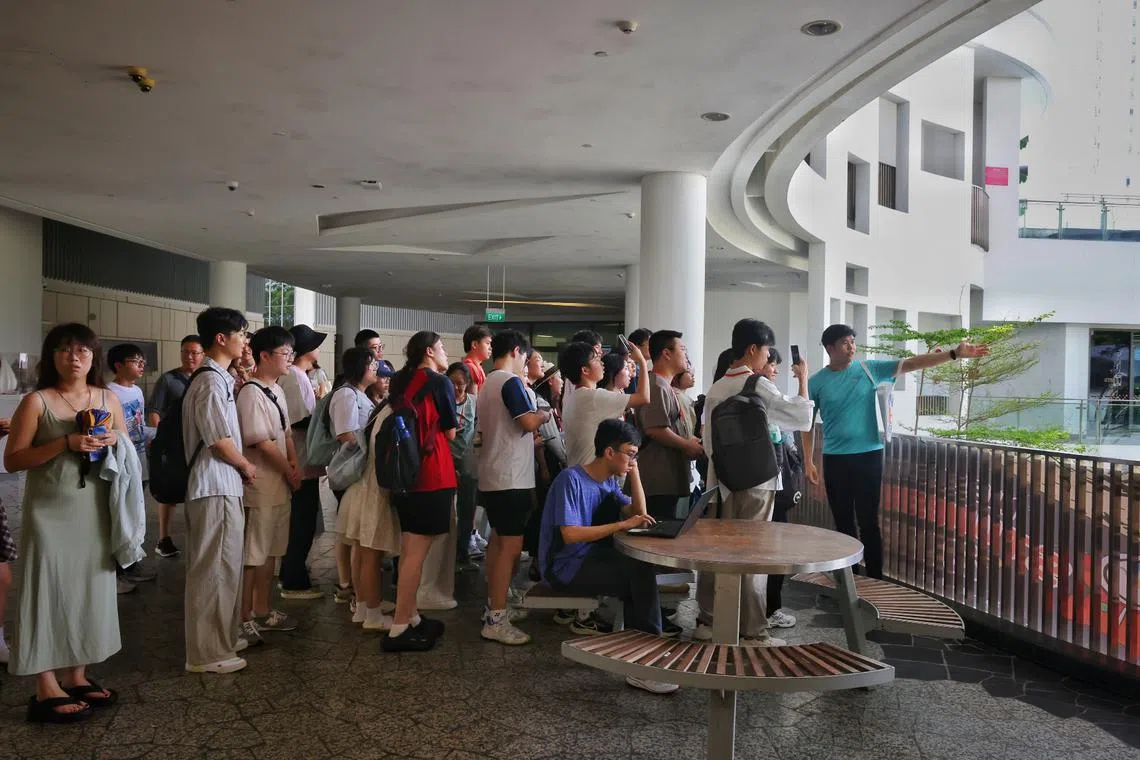Tour buses entering NUS will need to register for limited daily slots by January 2025
Sign up now: Get ST's newsletters delivered to your inbox

NUS introduced more measures to manage tourist traffic on Aug 16, including stationing security personnel at selected bus stops.
PHOTO: SHIN MIN DAILY NEWS
Follow topic:
SINGAPORE - By January 2025, tour buses entering the National University of Singapore (NUS) will need to register for limited daily slots, as part of longer-term measures to regulate visitor traffic on campus.
This includes tour buses bringing visitors to museums on campus and for official programmes and events. Priority will be given to this group of buses, said the university in a circular on Aug 21.
“This registration measure helps regulate the number of tour buses on campus, ensuring smooth traffic, pedestrian safety, efficient running of our internal shuttle bus services, and ease of point-to-point commuting for our staff and students,” it added.
Tour buses ferrying people for registered tours by NUS student ambassadors, who are paid to give guided tours, will be exempt from registration.
NUS added that by January 2025, all students running tours on campus will also need to register with the Office of the Provost.
They will receive annual training equivalent to the training provided to student ambassadors and be certified as registered student docents. They will also need to wear a special ID to be easily identifiable.
“In our engagement with NUS Students’ Union (Nussu) and after hearing student feedback, we acknowledge that more needs to be done and will be introducing a number of new, longer-term measures to address the challenges around the high tourist traffic on campus during peak travel seasons,” said the circular.
The aim is for these measures to be ready by January 2025, in time for the next tourist peak season, said NUS. The peak seasons are January to February and July to August.
Speaking to the media after a town hall meeting organised by Nussu on Aug 21 to address students’ concerns about the recent influx of tourists, NUS associate provost Daniel Goh said the new measures are meant for the long term.
He added that the evening town hall was a constructive two hours spent listening to the students’ feedback.

A "No Tourists" sign seen on a NUS shuttle bus at U-Town in NUS on Aug 16, 2024.
ST PHOTO: JASON QUAH
All 120 seats of the NUS University Hall Auditorium, where the town hall was held, were filled. About 50 students were redirected to a lecture theatre where a live stream of the session was broadcast.
NUS is also looking to come up with “a technology-based visitor access system so that we can control crowds where we need to – in specific places like foodcourts, canteens and internal shuttle buses”, said Associate Professor Goh.
A fourth-year NUS student, who wanted to be known only as Samuel, described the discussion as a “consultative process” and felt that the NUS management was trying to listen to the students.
The 24-year-old said: “I think it’s hard to get a sense of the whole community’s concerns. The measures the management talked about look good on paper. But I hope that at the end of the semester, there is some follow-up to see the effects of the policies.”
Incoming Raffles Hall president Mohammad Afiq Ihsan Mohammad Hussien, 23, said he could sense how strongly the students present at the town hall felt about the surge in tourists and how it has affected them. He said that other students staying at his hall have complained about trespassers there.
The third-year chemical engineering student said: “We were questioning why more wasn’t being done at an earlier stage of this problem. But today, the management sought our understanding that they have limited resources and face constraints when addressing these issues.”
Nussu president Huang Ziwei, 25, said: “Students have very strong opinions and want to hear a concrete solution on the spot. I don’t think it’s very unfair for them to say that if it has been a persistent issue. So the discussion had a tense mood at times. But I think the students were also quite constructive and gave context to the issues they faced.”
He added: “Prior to the town hall, there were discussions between the union, faculty leaders and university staff. But they may have taken a more experimental ‘trial and error’ approach to see if their measures work. From the students’ perspectives, it’s not enough, which is why the town hall was called to ask them for stronger measures.”
In the Aug 21 circular, NUS said registered student docents must reserve slots for tours they wish to conduct, and only limited slots are available each day to manage the footfall on campus.
“They will have to strictly follow the university’s guidelines on campus tours and adhere to visitor etiquette to ensure that education and other activities of the university will not be disrupted.”
NUS added that providing tour guide services without a valid licence from Singapore Tourism Board (STB) is an offence under Singapore law.
“We strongly encourage all students running tours on campus to come forward to register with us,” it said.
Tour groups led by STB-licensed guides should sign up for the free tours, which will be led by student ambassadors, said NUS, and tourists without an STB-licensed guide can engage the trained registered student docents.

A student ambassador taking tourists on a tour of U-Town in NUS on Aug 16.
PHOTO: ST FILE
Unlicensed tour guides found conducting tours in NUS will be reported to the authorities, while students conducting unreserved tours will be subject to disciplinary action.
“This registration measure addresses the challenge of many large groups on independent tours led by tour guides accompanied by students who may not be familiar with our visiting guidelines and etiquette,” said NUS.
The university is also working on improved access control solutions that will allow official guests and partners, as well as service providers, to gain access to campus facilities.
These visitors include conference and programme participants, research and teaching collaborators, as well as benefactors and donors, who are part of the university community and integral to its academic activities, said NUS.
Since Aug 14, it has also reinstated access control to the NUS Central Library and Medicine+Science Library, to ensure priority for its students and staff. The need for card access had been earlier removed in May on a trial basis, to foster the use of the libraries as shared spaces.
The latest plans come after a series of measures recently implemented to manage visitor traffic, such as ensuring tour buses pick up and drop off visitors only at designated points and increasing the frequency of internal shuttle buses.
On Aug 16, NUS introduced more measures to manage tourist traffic,
The Straits Times reported on the influx of tourists as early as February.

